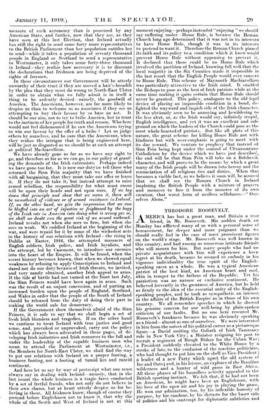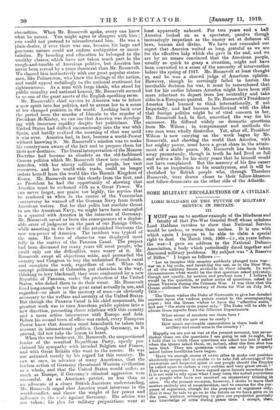THEODORE ROOSEVELT.
AMERICA has lost a great man, and Britain a true friend, in Mr. Roosevelt. His sudden death on Monday has afflicted many of us with a personal sense of bereavement, far deeper and more poignant than we should really feel in the ease of most prominent figures on the world's stage. Mr. Roosevelt was well known in this country, and had among us numerous intimate friends who will mourn for hint. But many people who had no private acquaintance with him will experience a keen regret at his death, because he seemed to embody in his vigorous individuality the true spirit of the English- speaking races as a whole. He was a typical American patriot of the best kind, an American heart and soul, akin in temper to the fathers of the Republic. Yet his patriotism was no narrow or exclusive sentiment. He believed fervently in the greatness of America, but be held as firmly to the idea of the essential unity of the English- speaking peoples, and he took as sympathetic an interest in the affairs of the British Empire as in those of his own country. We all remember speeches in which he showed his genuine concern for our well-being by plain-spoken criticism of our faults. But no one here resented Mr. Roosevelt's frankness because he was obviously speaking as a friend—almost as one of ourselves. We were interested in him from the outset of his political career as a picturesque figure—a David smiting the Goliath of Irish Tammany rule in New York City ; a Minister resigning his post to recruit a regiment of Rough Riders for the Cuban War; a President suddenly elevated to the White House by a stroke of fate, to the confusion of the machine politicians, who had thought to put him on the shelf as Vice-President ; a leader of a new Party which upset the old system of Ins and Outs; and, in his leisure, an explorer of the Brazilian wilderness and a hunter of wild game in East Africa. All these phases of his boundless activity appealed to the British sporting instinct. We felt that, if he had not been an American, he might have been an Englishman, with his love of the open air and his joy in playing the game. He won our admiration, too, by his inflexible honesty of purpose, by his candour, by his distaste for the baser side of politics and his contempt for diplomatic subtleties and obscurities. When Mr. Roosevelt spoke, every one knew what he meant. You might agree or disagree with him ; you could not pretend to misunderstand him. He was a plain-dealer, if ever there was one, because his large and generous nature could not endure ambiguities or uncer- tainties. By breeding and education he belonged to the wealthy classes, which have not taken much part in the rough-and-tumble of American politics, but America has never been served by a truer democrat than Mr. Roosevelt. We classed him instinctively with our great popular states- men, like Palmerston, who knew the feelings of the nation, and could appeal unfailingly to the national sentiment for righteousness. As a man with large ideals, who stood for public morality and national honour, Mr. Roosevelt seemed to us one of the great assets of the English-speaking races. Mr. Roosevelt's chief service to America was to infuse a new spirit into her politics, and to arouse her to a sense of her &ranged position in the world. Looking back over the period from the murder of Lincoln to the murder of President McKinley, we can see that America was develop- ing with immense rapidity despite her politicians. The United States had drifted unconsciously into the war with Spain, and hardly realized the meaning of that war until it was over. America had, in fact, become a world-Power without knowing it. Mr. Roosevelt's mission was to make his countrymen aware of the fact and to prepare them for their new destinies. The literal interpretation of the Monroe Doctrine had become as obsolete as the old-fashioned Caucus politics whioh Mr. Roosevelt throw into confusion. America, with her ninety millions of people, her vast resources, and her world-wide trade, could no longer isolate herself from the world like the Hermit Kingdom of Korea. Mr. Roosevelt saw this clearly from the first, and as President he had the opportunity of showing that America must be reckoned with as a Great Power. We can never forget, nor praise too highly, the service that he rendered us when in the course of the Venezuelan controversy he warned off the German Navy from South American waters. But for that polite but resolute threat to use the American Navy, we might have been entangled in a quarrel with America in the interests of Germany. Mr. Roosevelt saved us from the consequences of a deplor- able error of judgment on the part of our Foreign Office, while asserting in the face of the astonished Germans the new sea-power of America. The incident was typical of the man. His force of character was displayed most fully in the matter of the Panama Canal. The project had been discussed for many years till most people, who could only see the difficulties, were weary of it. Mr. Roosevelt swept all objections aside, and persuaded the country and Congress to buy the unfinished French canal and complete the work, regardless of cost. When the corrupt politicians of Colombia put obstacles in the way, thinking to levy blackmail, they were confronted by a new Republic of Panama; under the protection of the United States, who defied them to do their worst. Mr. Roosevelt lived long enough to see the great canal aotually in U1313, and regarded—so short is the memory of man—as obviously necessary to the welfare and security of the United States. But though the Panama Canal is his chief monument, his greatest work was to turn American public opinion into a new direction, promoting closer relations with this country and a more active intercourse with Europe and Asia. Before his second term of office was ended, every European Power knew that America must henceforth be taken into account in international politics, though Germany, as it proved, did not take the lesson to heart. When the war broke out, Mr. Roosevelt, the unquestioned leader of the reunited Republican Party, openly pro- claimed his sympathy with invaded Belgium and Francs, and with Great Britain who went to the rescue. He was not actuated merely by his regard for this country. He saw at once, in advance of many Americans, that the lawless action of Germany threatened Western civilization as a whole, and that the United States would suffer, as much as Europe, if Germany's criminal aggression were successful. As an American patriot, no less than as an advocate of a closer British-American understanding, Mr. Roosevelt urged that America must intervene in the world-conflict, and throw the weight of her power and influence in the scale against Germany. His advice was not taken ; his plea for military preparations went at
least apparently unheard. For two years and a half America looked on as a spectator, passive though increasingly impatient as the enemy set at defiance all laws, human and divine. We have not concealed our regret that America waited so long, grateful as we are for the effective help which she gave in the end, and we are by no means convinced that the American people, usually so quick to grasp a situation, might not have been converted to a sense of the necessity of intervention before the spring of 1917. Mr. Roosevelt at least thought so, and he was a shrewd judge of American opinion. However, though he seemingly failed to hasten the inevitable decision for war, it must be remembered that but for his earlier labours America might have been still more reluctant to depart from her neutrality and take sides in a European quarrel. In Mr. Roosevelt's Presidenoy America had learned to think internationally, if not Imperially, and had become familiarized with the idea that foreign polities might be of vital concern to her, Mr. Roosevelt had, in fact, smoothed the way for his successor. Ho differed widely on domestic questions from Mr. Wilson ; in temperament and methods the two men were wholly dissimilar. Yet, after all, President Wilson is now carrying on the work begun by Mr. Roosevelt, and showing the world that America, with her mighty power, must have a great share in the attain- ment of a stable peace. Mr. Roosevelt has been taken away prematurely, though in truth he had lived so full and active a life for his sixty years that he himself would not have complained. But the memory of his fine career will be an inspiration to his countrymen, and it will be cherished by British people who, through Theodore Roosevelt, were drawn closer to their fellow-kinsmen and fellow-democrats on the other side of the Atlantic.



































 Previous page
Previous page